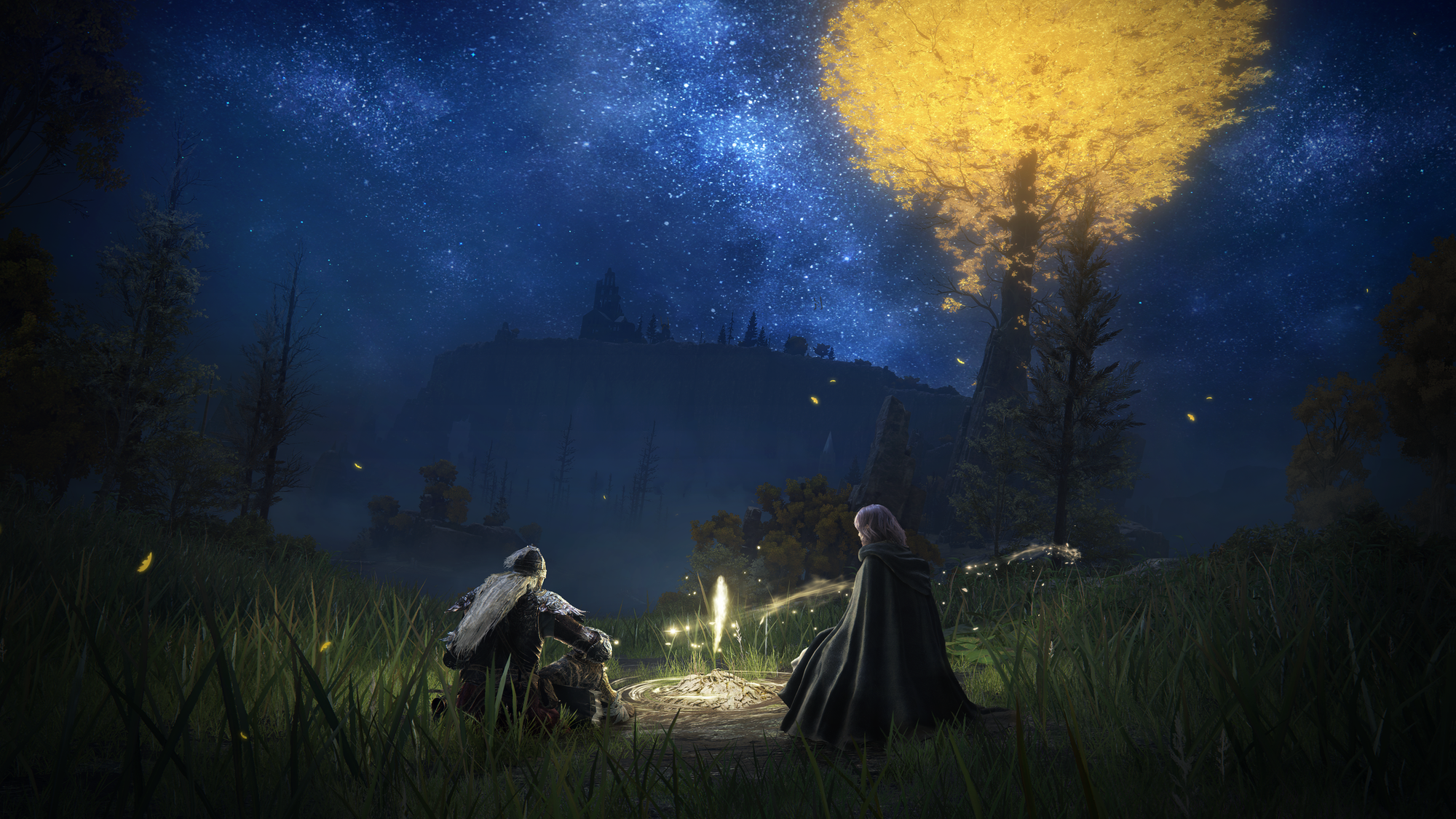What is Elden Ring About?
Is Elden Ring about ambiguity...or is it simply ambiguous?

Elden Ring is steeped in ambiguity. Its ambiguity exists on two levels. First, we have FromSoftware’s typically oblique storytelling approach, in which the player must piece together what’s going on via item descriptions, cryptic dialogue and clues sprinkled throughout the world. The world of Elden Ring is sprawling, but dense. Everywhere you look, there’s an item with a description that fleshes out the world, or an instance of environmental storytelling that contextualizes the reading you’ve done so far. But once you finally put together all the pieces available to you, the picture that emerges is still murky. Elden Ring is not a very forthcoming game, and without knowing why its events transpired the way they did, it becomes difficult to understand what the game is trying to say.
Themes in other FromSoftware games
This difficulty is unusual when you compare Elden Ring to FromSoftware’s other recent titles. Despite conveying information in a similarly fragmented way, once a player has enough pieces, the themes of those games become evident. Dark Souls' central idea is of the cyclical nature of things; that all things eventually come to an end to make way for the new, and resisting this will only lead to stagnation and prolongs the inevitable. Bloodborne is an examination of the dangers of excessive greed and pride, and uses cosmic horror to illustrate how this ruthless pursuit of goals leads to horrors beyond comprehension. Although its storytelling approach is more direct, Sekiro: Shadows Die Twice’s theme is a variation on the Dark Souls games’: immortality isn’t a blessing but a curse, and that the finite nature of life is what makes it precious. These games’ settings, characters and stories all serve to illustrate these themes in one way or another. It’s less easy to interpret Elden Ring’s central message. Its numerous characters, locations, weapons, spells, incantations, and game mechanics simply don’t converge upon any one idea.

What do Elden Ring's endings tell us?
So what is Elden Ring about? Examining the way the game ends is a good way to identify the thematic elements considered important enough to be present at the story’s conclusion. There are three possible main endings for the game: Elden Lord (which has four variations), the Age of Stars, and the Lord of the Frenzied Flame.
The Lands Between is a broken world. Unlike the world of Dark Souls, where the only meaningful change that can be made is to end the world as it is, there are numerous contrasting ways to deal with the state of the world in Elden Ring. Unlike Yharnam of Bloodborne and Ashina of Sekiro, which are both undergoing upheaval and transition, the Lands Between has already gone through its transition and the preceding Golden Age has already ended. The main storyline of Elden Ring, and the multiple endings, become differing approaches to deal with a broken world.

The Elden Lord ending, achieved by following the main story to its conclusion, ends with the world being ‘repaired’ into a similarly median state: something less than what it was at its peak, but better than the brokenness of the game’s opening. The variations on this ending are incremental changes of varying magnitudes to the state of the world (ranging from ‘Zombie Rights’ to ‘Everyone everywhere is now cursed forever’), but the fundamental structure of the world isn’t altered. The world is still governed by the Golden Order. The Age of Stars and Lord of the Frenzied Flame ending are more stark departures from the status quo, and to achieve them, the player must deviate from the main story and pursue optional questlines. The Age of Stars ending is ambiguous in its specifics, but the main idea seems to be this: let us break away from the established order to exist in a new, completely different one. The Lord of the Frenzied Flame is much less opaque; the world is destroyed, thoroughly consumed by the Frenzied Flame. Maybe it's to make room for something new, maybe this is the final state of the world. The game doesn't tell you either way.
I believe that these endings can be interpreted as vastly differing approaches to dealing with a broken or failed system. When it is clear that something no longer works, whether that’s a friendship between two people or the government of a country, when it is so non-functional that you can’t even call it stagnant, how do you proceed? Do you try to rebuild it, perhaps even make a few small improvements where you can? Do you leave it behind and move onto something else, something new and different? Or do you simply destroy it for good?
In this case, which ending does the game itself suggest is best? Elden Ring is characteristically oblique in how it depicts these three endings, and the surrounding context of the game’s world and characters makes it possible to interpret the endings in a number of ways. I personally think the Age of The Stars ending is the most optimistic and positive one. And I’m not alone; the global achievement statistics on Steam show that this ending is the most popular one. However, it could be easy to interpret this ending negatively; there is no guarantee that the Age of the Stars will be better than what came before.

Is Elden Ring about ambiguity?
And I think that’s the heart of the matter. There is simply too much ambiguity, too much room for interpretation that it’s hard to understand what the game wants to convey. It’s possible that this ambiguity is a feature and not a bug. Something that struck me about Elden Ring was how every second character seemed to be assuming a false identity for some reason or other. When you get to know the characters better, they all have an agenda they wish to further. This seems to tell us to not take most characters at face-value and to question their actions. Another aspect of Elden Ring’s lore that stands out to me is that most factions seem structurally similar to each other. Each one seems to be helmed by a different Outer God that wishes to expand its influence, each one has on the Lands Between a godlike figure that represents them, a hierarchy of foot soldiers, and finally (and this is the one that really drove it home for me), each faction has a cabal of assassins to carry out its dirty work. These similarities between the factions add to the sense that there’s no ‘right option’.
I’ve always thought of myself as someone who appreciates the value of ambiguity in fiction. I like unresolved endings, character motivations that can be interpreted in multiple contradictory ways, and forever-unsolved mysteries when they make sense for the stories. And yet Elden Ring challenges that notion I’ve had of myself. On a personal, purely subjective level, I don’t like not knowing what Elden Ring is trying to say. I don’t like not knowing why Marika shattered the Elden Ring. I don’t like not knowing of the Age of Stars is a good ending, I don’t like not truly knowing what Elden Ring is about and I don't like the possibility that I may never know.
Most works of fiction have some central idea, or theme that’s relatively identifiable. Elden Ring isn’t like that, not for me anyway. Nevertheless, it’s a game I’ve thoroughly enjoyed my time with, and it’s demonstrated to me that a story doesn’t have to have a clear-cut message or theme or idea to be considered good or worthwhile. Elden Ring is hardly a ‘mindless fun turn your brain off and swing the weapon’ kind of game. It’s substantial in mechanics, presentation and narrative. It's somber in mood, filled with moments of immense, beautiful desolation. I used to think that there is some missing piece of the puzzle, some thing I was just not seeing that would tie the game up together. But it’s been months and either I’m oblivious or that easy answer just doesn’t exist. I am almost certain that upcoming DLC won’t fill in these pieces either.
Maybe ultimately Elden Ring is a game about ambiguity, about not getting any easy answers, about not truly ever knowing all the characters' motivations, and living with the knowledge that there's a possibility that the ending you picked may not be what was best for the world. Uncertainty is a staple of life, after all, and there's something moving about the ambiguity of this large-scale epic high-fantasy magnum opus resonating with the many uncertainties of ordinary life. True to the spirit of this ambiguity though, I may never know for sure.
